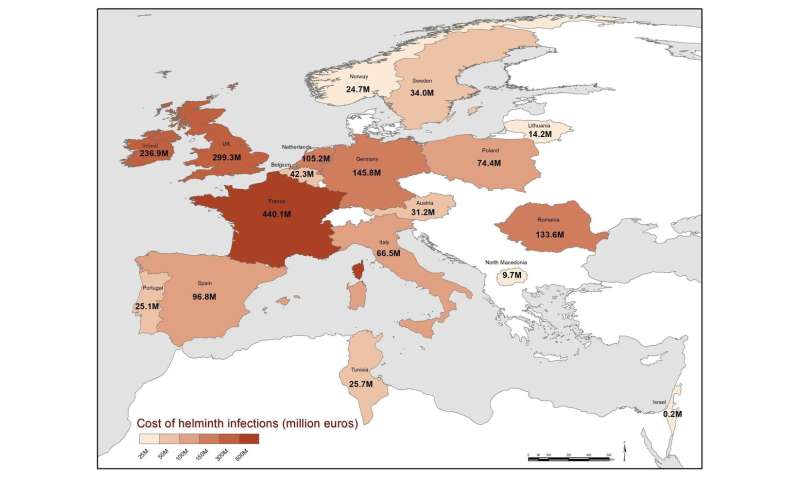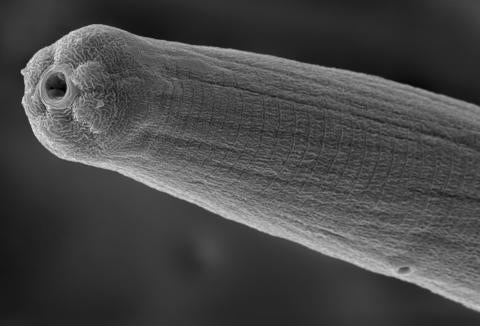Drug resistant parasites cost European livestock industry millions each year - Phys.org
Drug resistant parasites cost European livestock industry millions each year - Phys.org |
- Drug resistant parasites cost European livestock industry millions each year - Phys.org
- Creature Comforts: A few of my favorite freeloaders | News, Sports, Jobs - Williamsport Sun-Gazette
- Parasitic worm venom evades human immune system - UC Riverside
| Drug resistant parasites cost European livestock industry millions each year - Phys.org Posted: 31 Jul 2020 06:27 AM PDT  An international research study has estimated that drug-resistant parasitic worms cost the European livestock industry more than €38 million per year in production losses and veterinary costs. Parasites can cause major welfare and productivity problems in cattle, sheep and goats worldwide, affecting growth, fertility and milk production. Worryingly, drug resistance is increasing against the veterinary medicines widely used to treat and prevent infection. This means that current farming methods may not be sustainable in the longer term. Now a major new study has estimated that parasitic worms cost the European livestock industry more than €1.8 billion per year, with drug-resistance costing at least €38 million per year in production losses and treatment costs. The study can support the identification of livestock sectors and regions where the largest losses occur and inform control programs and research policies at national and European level. Agricultural economic data was combined with the latest data on the levels of disease and drug-resistance in 18 European countries. Data were not available for all European countries and only one class of veterinary medicine was included in the analyses. There are five classes of veterinary medicine available to treat parasitic worms in livestock, and drug resistance is widespread against at least three of these classes. This means that the costs are likely to be higher than the conservative estimates reported in the study. The study was led by Dr. Johannes Charlier of the Belgian scientific consultancy Kreavet, as part of a European Cooperation in Science & Technology COST Action, COMBAR (Combatting Anthelmintic Resistance in Ruminants). It involved a total of 23 organizations who brought together regional expertise and the latest data on the economic impacts of parasitic disease in the European livestock industry. Explore further More information: J. Charlier et al. Initial assessment of the economic burden of major parasitic helminth infections to the ruminant livestock industry in Europe, Preventive Veterinary Medicine (2020). DOI: 10.1016/j.prevetmed.2020.105103 Provided by European Cooperation in Science and Technology (COST) Citation: Drug resistant parasites cost European livestock industry millions each year (2020, July 31) retrieved 1 August 2020 from https://phys.org/news/2020-07-drug-resistant-parasites-european-livestock.html This document is subject to copyright. Apart from any fair dealing for the purpose of private study or research, no part may be reproduced without the written permission. The content is provided for information purposes only. |
| Creature Comforts: A few of my favorite freeloaders | News, Sports, Jobs - Williamsport Sun-Gazette Posted: 31 Jul 2020 09:21 PM PDT • Employ stealth tactics to siphon off nutrients without any notice of the host. • Picking on unthrifty, very young, weak, or debilitated hosts is asking for trouble. • Don't get greedy. • Don't kill the host. Heartworms, hookworms, tapeworms, coccidia, giardia, fleas, ticks, lice, scabies, ear mites — so many choices to discuss, but alas, so little space and time. Parasites come in all shapes, sizes and with variably complicated life strategies. Here are just three interesting ones: The Eyes — Er — Eyelashes Have It There's a species of Demodex mite that dwells within the hair follicles and sebaceous glands of the skin. These microscopic mites are species-specific, meaning dogs, cats, and other animals each have their own type. Human Demodex mites inhabit the skin around our eyelashes. It's estimated that anywhere from 23 – 100% of people are hosts for this parasite. You read that correctly. Most people or animals that have Demodex don't know it. Demodex mites typically cause no troubles to their hosts, happily doing their own thing, getting married, having families (all within about 14 days) living out their several-week-long lives, undisturbed. While this story often makes people want to scratch their own eyes out, it really shouldn't. Dermatologists only prescribe treatments to control Demodex mites for patients with skin abnormalities consistent with Demodex overpopulation. In all cases of Demodicosis, doctors look for an underlying immune or skin issue that caused the mite population explosion. So, even though it isn't their fault, Demodex are often eliminated from the site in an effort to treat the skin. Round and Round The humble roundworm is a fairly common parasite that inhabits animals' small intestines. Roundworm infestations can be acquired in utero, while nursing, eating prey, or from direct consumption of the eggs in infected stool. Since young animals are prone to eating all sorts of weird stuff, they make excellent targets for the parasite to begin a new invasion. Roundworms complete their entire life cycles within their host: egg to larva to egg-producing adult — a process that takes place in the GI tract and other internal tissues in a span of approximately 14-28 days (for the species Toxocara canis.) It's a pretty efficient survival strategy, provided nothing goes wrong. Youngsters can become overburdened with multiple types of internal parasites, which necessitates treatment. Roundworms are easy to eliminate from animals with safe, effective dewormers, but if you're squeamish, I'd advise not serving spaghetti for dinner after just administering dewormer to your new puppy or kitten. Roundworms can end up being accidentally ingested by non-ideal hosts (like people.) This scenario's kinda scary for both the parasites and for the accidental host: the roundworm larvae don't know where to migrate to complete their life cycle, and end up getting confused, potentially causing serious illness (liver disease and blindness being two biggies) in the infected person. This is not ideal for either party. It's Not Just a Fluke … … it's a parasitic creative GENIUS. The parasitic flatworm Dicrocoelium dendriticus is an internal parasite of ruminants commonly called a "liver fluke" that employs the help of several different hosts throughout its life cycle. While this tactic is not unique to the flatworm (the ticks that carry Lyme Disease, for instance, utilize several different critters on their path to maturity and self preservation) this particular parasite has upped the ante. Like most internal parasitic worms, it starts out as a microscopic egg in a pile of poo, in this case, the dung of cows or sheep. The egg is ingested by a snail, hatches into an immature worm within this intermediate host, migrates through different tissues of the snail, and is eventually expelled through the snail's respiratory system within tiny slime balls. What eats snail slime balls? Ants. An ant that ingests the tiny, immature fluke then becomes a temporary (paratenic) host for the parasite. This is where it gets really interesting. The fluke finds its way into the ant's central nervous system and practices mind control! Each night, the ant will climb to the tippy-top of a blade of grass, and clamp its mandibles to the grass all night. Cleverly, the parasite allows the ant to resume its normal activities by day, but compels the ant to perform the strange behavior each night, while the grass is cool and dewy. This cycle continues until the ant is consumed by a grazing animal. Score! Once inside the digestive tract of the cow or sheep, it can reach full maturity and invade the liver and bile ducts, and will go on to reproduce, shed eggs in the animal's stool, and begin the cycle, again. The liver fluke is a LITERAL master mind. Want to avoid getting liver flukes? Don't eat any ant zombies. Fair warning. — Daverio is a veterinarian at Williamsport West Veterinary Hospital. Her column is published every other Sunday in the Lifestyle section. She can be reached at life@sungazette.com. |
| Parasitic worm venom evades human immune system - UC Riverside Posted: 20 Jul 2020 12:00 AM PDT It's likely that billions of people are unaware they have been infected with parasitic worms. A UC Riverside scientist has won $1.8 million to try and understand why. The National Institutes of Health granted an Outstanding Investigator Award to Adler Dillman, an assistant professor of parasitology, so he can shed light on the mystery of worm infections that escape detection by human immune systems. By some estimates, nearly a quarter of the world's population is infected with various types of microscopic worms, or nematodes, with effects ranging from cognitive impairment and blindness to debilitation, elephantiasis, and death. Examples include hookworm, which thrives in the American South, causing developmental delays and anemia; and pinworms, which commonly infect children and child care workers with an itchy perianal-area rash. "You can have a person riddled with infection who never realized there's a 2-centimeter-long worm in their eye and thousands of parasites in their blood," Dillman said. "The immune system never signaled something was wrong. How is that possible? We know very little about how that works." Dillman is focused specifically on the proteins that nematode spit releases into hosts during an infection. "Venom also describes this accurately," Dillman said. Scientists know the venom alters the immune system of a host and somehow helps the worms avoid detection. However, there are hundreds of proteins released in nematode venom during an infection, and only about 10 have been characterized and understood. Laboratories studying nematode venom proteins often begin by observing the effects in mice and rats. However, Dillman's lab takes a unique approach by studying nematodes that parasitize fruit flies. "It's easy and inexpensive to work with flies, and there is much less red tape associated with them compared to vertebrates," Dillman said. "Though we're working with flies, this work has real potential to impact human health." Unlike other grants, the Outstanding Investigator Award funds a research program rather than a specific project. This increases the flexibility for scientists to follow new research directions as opportunities arise instead of adhering to objectives proposed in advance of the studies. Spread out over five years, these funds will enable Dillman to hire a postdoctoral researcher, support graduate researchers, and purchase biochemistry equipment. Recently, Dillman was also the recipient of a UCR Office of Research and Economic Development grant. For that project, Dillman is working toward a pesticide based on nematode venom, and on modifying crops to secrete a version of the toxin in the venom, which would give them natural resistance to insect attacks. "Nematodes are devastating parasites of humans, capable of modulating our biology in numerous ways, including suppressing our immune systems," Dillman said. "The goal of my lab is to understand this modulation and to characterize the chemical pathways that allow it to happen." Dillman said one of the things that most interests his students is the idea that parasites aren't necessarily always bad. The hygiene hypothesis proposes that in places with highly developed sanitation systems, human immune systems don't develop properly because they are not challenged by infection. "There's compelling data that parasites could even be used to treat autoimmune disorders such as Crohn's or inflammatory bowel disease," he said. "Parasitic worms are just the coolest things you could study because there are so many strange interactions, both positive and negative, that occur between the worms and their hosts." |
| You are subscribed to email updates from "How do you treat parasites" - Google News. To stop receiving these emails, you may unsubscribe now. | Email delivery powered by Google |
| Google, 1600 Amphitheatre Parkway, Mountain View, CA 94043, United States | |


Comments
Post a Comment